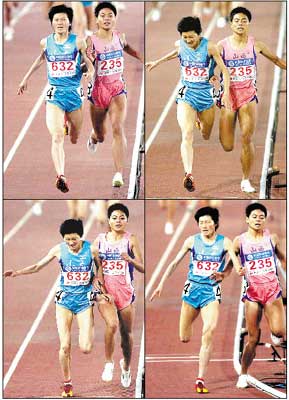|
China puts glory before honour at National Games
(Reuters)
Updated: 2005-10-25 09:33
The many controversies which marred China's National Games have raised
pointed questions about sportsmanship and athletic priorities as the country
prepares for the 2008 Beijing Olympics.

Xing Huina [L] and Liu Qing dashing towards
finish line. [sina] | From doping to thrown
matches to biased judging, the domestic "mini-Olympics" that ended on Sunday in
eastern Jiangsu province was riddled with embarrassments blamed by some on a
government-sponsored athletic culture that stresses greater glory over love of
sport.
"In China, the concept of athletic spirit is too narrow. The blind pursuit of
championships and titles still dominates Chinese sport," Song Jixin, director of
a regional sports academy, was quoted as saying in the China Youth Daily.
Almost 10,000 athletes representing 46 provinces, regions and groups,
including the People's Liberation Army, took part in the games, burdened with
demands to bring back medals in return for potentially huge rewards from
provincial authorities and local businesses.
"Competition under that kind of pressure goes against the Olympic spirit,"
the state-run China Youth Daily said in a commentary.
The hosting Jiangsu province ended up with the highly coveted top spot in the
medals table.
More pressure and money came from central sports authorities looking to groom
new talent for the 2008 Olympics and push established athletes to give their
all.
AdvertisementAdvertisementBy the end of the games, the stress had proved too
much for many athletes, who either failed to live up to sky-high expectations or
resorted to breaking the rules to do so.
Leading distance runner Sun Yingjie last week tested positive for a banned
steroid.
Olympic medallist Xing Huina was denied her gold in the 1500m for elbowing an
opponent, saying after the race that she had simply wanted to win.
The women's 78kg judo final had to be replayed after one of the competitors
threw the match in less than 30 seconds, while a cycling bronze medallist
accused the top two finishers with deliberately blocking her and refused to
accept her prize.
The controversies left audiences jaded and wondering whether the National
Games are worthwhile.
"The National Games are a product of the planned economy. The event should
have disappeared with the development of society," sociologist Zeng Yefu said.
"How many people pay attention to the games any more?" Flagging interest in
the domestic sports extravaganza did not stop the Jiangsu government spending at
least $NZ982 million on building venues, including a new 70,000-seat showpiece
stadium.
The construction bill is equal to one third of Beijing's budget for stadiums
and other facilities for the 2008 Olympics.
"Do not forget, the funding for the sports sector comes from taxpayers that
do not want to pay for games tainted by scandals," the China Daily warned in a
commentary that called the National Games "farcical".
China's sports authorities appear undaunted, however, already planning the
2009 edition of the domestic games with preparations for 2008 in full swing.
"The success of the 10th National Games," Liu Peng, head
of China's General Administration of Sport, was quoted as saying, "shows that
China has the ability to hold a successful Olympics."
|